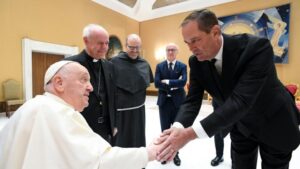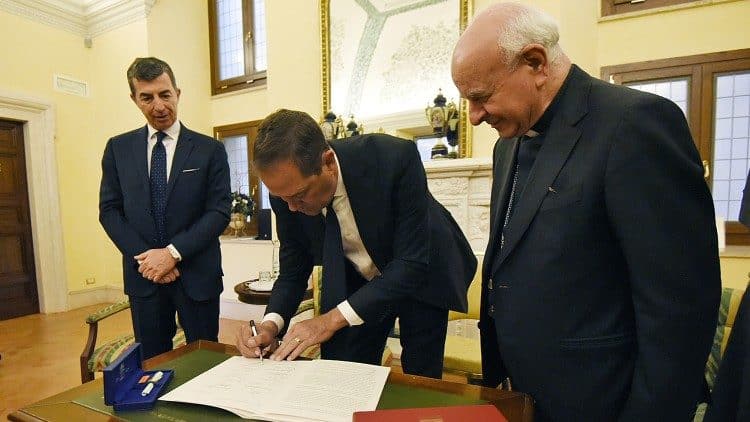“We are very pleased that Cisco has joined the Rome Call because it is a company that plays a crucial role as a technology partner for the adoption and implementation of artificial intelligence, offering skills for infrastructure, security and protection of data and AI systems.” These are the words spoken by Archbishop Vincenzo Paglia, president of the Pontifical Academy for Life and the RenAIssance Foundation, commenting on the event at which Chuck Robbins, CEO of Cisco System Inc., signed the Rome Appeal today for the Ethics of AI (Rome Call for AI Ethics). “When in 2020, for the first time, we drew the world’s attention to the need and urgency to call for algorithm-ethics, or rather ethics, in the design of the algorithms underlying artificial intelligence, we inmediatly understood that the moment had come the moment,” Monsignor Paglia continued. “Today we know that AI is no longer a sectoral issue, and reflecting on the ethics of its development is more urgent than ever. This new signature from Rome Call proves it.”
Cisco signing today in Rome
This Monday took place the signing ceremony of the document already signed by international technological actors such as Microsoft and IBM, institutions such as the FAO, countless universities around the world, companies and individuals, as well as by representatives of the three Abrahamic religions, took place this morning in Rome. “Artificial intelligence is fundamentally changing our world, presenting great opportunities, but also new challenges. For nearly 40 years, Cisco has built the networks that connect people and organizations around the world, and today we are building the critical infrastructure and security solutions that will fuel the AI revolution,” said Chuck Robbins, president and CEO from Cisco. “The Rome Call aligns with Cisco’s belief that technology must be built on a foundation of trust at the highest levels, at the highest levels of security that will drive the AI revolution to promote an inclusive future for all”.

Ethics and Artificial Intelligence
The signing ceremony of the Rome Call for AI Ethics (Rome Call for AI Ethics) – reports the press release of the two promoters – has followed the audience of a delegation with Pope Francis this morning in the Vatican. At the conclusion of the event, Father Paolo Benanti, Extraordinary Professor of Ethics of Technologies at the Pontifical Gregorian University, Scientific Director of the RenAIssance Foundation and member of the United Nations Consultative Body on Artificial Intelligence, declared: “One of the key elements to facing the transformations of AI is the enablement of its capabilities, which are advancing rapidly and transforming many sectors. To enable AI capabilities in an ethical way, it is necessary to act in several directions: develop large, high-quality databases, and impartial to train AI models; provide access to cyber infrastructure; develop AI competencies; establish governance frameworks to manage AI development; and that AI systems are transparent, accountable and aligned with human values”.
A step forward
Cisco’s signing today of the Rome Call for AI Ethics, Father Bernanti concluded, “represents a step forward in this process, thanks to Cisco’s commitment to top-down thinking, proactive governance, and mitigation as well as a broad perspective on the transformative impact of AI on industries and society”.
The Rome Call for AI Ethics
The Rome Call for AI Ethics is a document conceived and promoted by the Pontifical Academy for Life, and subsequently by the RenAIssance Foundation, created by Pope Francis in 2021 specifically for dissemination, which advocates for an ethical approach to AI. artificial intelligence. The idea is to promote a sense of shared responsibility between international organizations, governments, institutions and the private sector in an effort to create a future in which every individual can benefit from advances in technology, and for technological progress guarantee respect for the dignity of each individual and our common home. By investing in a new algorithm, signatories commit to respecting the Rome Call principles of transparency, inclusion, accountability, impartiality, reliability, security and privacy.
The RenAIssance Foundation
The non-profit RenAIssance Foundation aims to support the anthropological and ethical reflection of new technologies on human life, promoted by the Pontifical Academy for Life. To achieve these objectives and disseminate the Rome Call for AI Ethics, the RenAIssance Foundation aims to promote scientific initiatives and collaborations with International Organizations, sovereign states, universities, research centers, private and public companies that develop activities, services and studies in the field of artificial intelligence.
The multinational Cisco
Cisco Systems Inc. was founded in 1984 in California (USA). Through intelligent networks and architectures that integrate products, services, and software platforms, and connecting people, processes, data, and objects, Cisco enables businesses and individuals to connect, communicate, study, and collaborate. Taking advantage of the potential of digitalization, and with the aim of creating an inclusive future for all, it operates in several sectors: it provides solutions, software and equipment for networks, computing, data centers, cloud environments; communication and collaboration platforms; and solutions and services for the cybersecurity of networks, data and applications. The company has also developed a global training program, called Cisco Networking Academy Programme, which allows students to learn to design, build and maintain networks that support national and global organizations, and specialize in areas such as application development or cybersecurity, among others. Since its inception, this program has provided basic and vocational computer training to more than 20 million people around the world.










